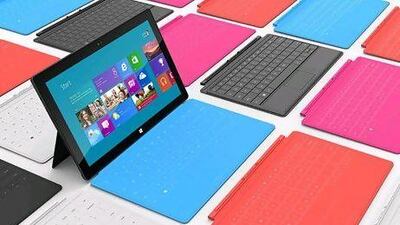Microsoft's long-awaited Windows 8 operating system (OS) is expected to launch in October together with a new Surface tablet computer designed to run the software.
But there are already rumblings that the launch may be a case of too little too late and that Microsoft may be unable to catch up with rivals such as Apple, which has an established lead in the tablet market.
"In tablet platforms, Windows is not a fast follower; it's not even a second or third mover. It's a fifth mover after iPad, Android tablets such as the Samsung Galaxy Tab, HP's now-defunct Web OS tablet, and the BlackBerry PlayBook tablet," says Sarah Rotman Epps, an analyst at the international research company Forrester.
She adds that Apple's iPad tablet computer has already encroached on business applications that should be Microsoft's strengths.
"The iPad is already cannibalising laptop usage… Every consumer and business that opts for iPad without a Windows alternative to consider is a customer that will be difficult or impossible to win over to Windows 8," she says.
Microsoft is, however, happy to stake its all on a late entry into the tablet market rather than be left even further behind by Apple. In the quarter that ended in June, Microsoft had revenues of US$18.1 billion (Dh66.48bn). But in the same quarter, Apple reported revenues of $35bn, almost double those of Microsoft.
There is now a growing view in Silicon Valley that, by concentrating on trying to manufacture a product to rival the iPad and others, Microsoft not only risks looking like an embarrassing old uncle turning up at a student party but could also estrange many of its existing business customers.
A major problem is Windows 8 is not reported to run well on existing corporate networks of PCs and laptops.
This is made worse since many companies are already struggling to introduce Microsoft's current OS, Windows 7 and some are still bemoaning the fact Microsoft is phasing out an earlier OS and long-time business favourite Windows XP.
"Windows 8 is designed for touch which means you need either a great touch screen or a great touch pad, it is annoying with a mouse," says the analyst Rob Enderle of the Enderle Group.
"If you don't have either, I'd stay with Windows 7 until you can afford new hardware.
"Generally, the best experience with any Windows version has been on the hardware designed to use it but this is especially true with Windows 8, which really requires hardware that matches the new interface," he says.
It could, however, be that Microsoft has already missed the boat as its rivals have already had plenty of time to win market share.
A survey conducted by Forrester showed in the first quarter of last year, 46 per cent of potential tablet owners in the United States wanted a Windows tablet. But by the third quarter, this number had dropped to 25 per cent.
"The cautionary tale here for Windows' product strategists is mind-share is low and falling; many months before their products will ever hit the market," says Ms Rotman Epps.
Yet it does appear Microsoft has managed to develop an OS that works well on tablet computers running microprocessors made by the chip maker Arm. "The biggest opportunity for Windows 8, and where it shines the best, is on Arm-based tablets positioned against their iPad and Android counterparts," says Mr Enderle.
This gives Microsoft an opportunity to play to its traditional strength of supplying its software to a wide range of manufacturers.
Forrester expects product strategists at an array of Microsoft's traditional manufacturing partners to offer Windows 8 tablets next year.
But the company's traditional manufacturing partners may be irritated by the fact the software developer is manufacturing its own Surface tablets.
In a US securities and exchange commission filing, Microsoft admits that could alienate some of its original equipment manufacturing partners.
Without the full support of its traditional manufacturing partners, Microsoft would find it tough to make Windows tablets compete with products from companies such as Apple, which have a proven record for design and branding of consumer products.
Microsoft is banking on being able to convince businesses to upgrade to Windows 8 using its new range of Surface tablet computers.
This is, potentially, a vast market. Forrester predicts that, in 2016, 375 million tablets computers of one kind or another will be sold worldwide and that about 122 million will go to businesses. That is a huge leap from the 10 million sold to businesses last year.
The question is not how well Windows 8 runs on Surface tablets but how many fickle users it can woo back from the likes of Apple without estranging too many of its long-term business clients.
twitter: Follow and share our breaking business news. Follow us
iPad users can read the digital edition of business section as it was printed via our e-reader app. Click here

